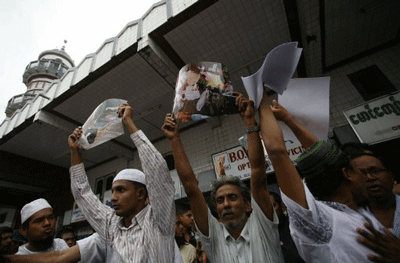




A state of emergency was declared in Burma's western Rakhine state on Sunday amid the worst fighting in years between Buddhists and minority Muslims.
President Thein Sein appeared on national television to appeal for calm and signed an emergency order, effectively allowing the military to take over administrative functions for the coastal state that borders Bangladesh.
This is believed to be the first emergency order he has signed since his nominally civilian government came to power in March last year after decades of harsh military rule.
The emergency action came after riots in two Rakhine areas on Friday left at least seven people dead and 17 wounded, according to state media.
The violence sparked off a week ago after the rape and murder of a Buddhist woman. An angry mob, mistakenly believing the perpetrators of the rape were on board a bus, beat 10 Muslim passengers to death.
This weekend, at least 500 houses and other buildings have been razed as the unrest spread with mob and revenge attacks, state media reported. One report said 5,000 people have been made homeless.
An RFA reporter who flew into Rakhine state's capital Sittwe at around 4 p.m. local time on Sunday said that he saw from his plane raging fires in homes in four areas.
There was tight security at Sittwe airport with two air force jet fighters and military personnel on standby.
Large Muslim population

"We are monitoring the situation and urge an immediate halt to violent attacks," Victoria Nuland, spokeswoman for the State Department, said in a statement.
"We also encourage the government to pursue an investigation in an expeditious and transparent manner that respects due process and the rule of law."
Last week, the Burmese government appointed a minister and senior police chief to head an investigation into the violence, announcing the order on the front pages of several state-controlled newspapers after Muslims in Rangoon held protests and netizens expressed their rage online over the killings.
Thein Sein said on Sunday that the violence was fueled by dissatisfaction harbored by different religious and ethnic groups and the desire for vengeance, calling on all groups "to help restore peace and stability and to prevent further escalation of violence."
The emergency was "intended to restore security and stability to the people immediately," he said.
Reforms at stake
Thein Sein warned that if the violence prevails, it could scuttle his reforms to bring democracy.
"[D]amage...could be done to the peace, stability, democratic process and development of our country during its period of transformation, if the unrest spreads," he said.
Maung Nyo, a member of parliament with the Rakhine Nationalities Development Party (RNDP), told RFA that curfews in key towns were announced just after noon on Sunday.
The curfew covered Sittwe and three other towns. A ban was also imposed on groups of more than five people.
Maung Nyo said he saw police arrest nearly 20 people who tried to set fire to homes.
In the predominantly Muslim area of Mauntaw, four camps have been established to house refugees, mostly Buddhists, who fled the riots. The camps were set up in two Buddhist monasteries and at the compounds of the state police headquarters and a school.
Residents at the camps believed 50 of their relatives were missing, one refugee said. The account could not be independently verified.
The tensions have raised concerns over a possible spiral of retaliatory violence, with the state newspaper New Light of Myanmar on Sunday warning of "anarchy."
Earlier in the day, around 600 ethnic Rakhine gathered at the Shwedagon Pagoda, a revered Buddhist site in the main city of Rangoon, demanding "Bengalis"—a term often used for Muslim communities living near the Burmese border with Bangladesh—be "removed" from Burma, Agence France-Presse reported.
People held up pictures of burning villages and victims apparently beaten in the attacks as well as banners proclaiming "Save the Rakhine."
Burma's Muslims account for an estimated four percent of the country's roughly 60 million population.
According to the U.N., Burma has an estimated 750,000 Rohingya, living mainly in Rakhine state.
Another one million or more are thought to live in other countries.
In Bangladesh, authorities said they were stepping up security along the border and in the refugee camps where around 300,000 Rohingya live.
Reported by Kyaw Kyaw Aung for RFA's Burmese service. Translated by Tin Aung Khine. Written in English by Parameswaran Ponnudurai.